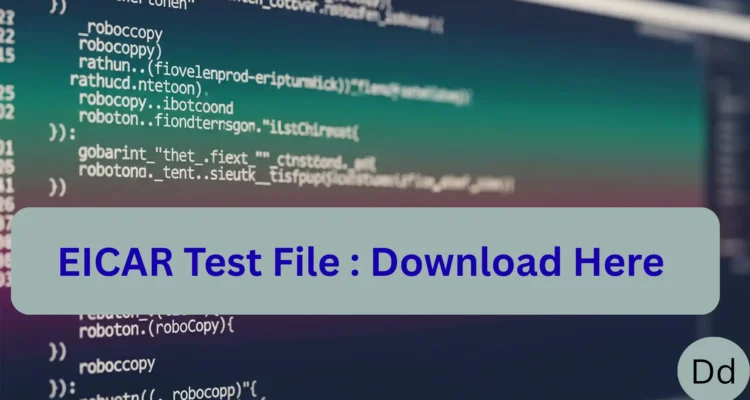EICAR Test File: The Complete Guide to Antivirus Testing

Also Read: What Is My IP Address? How to Find Your Public IP Address
What is the EICAR Test File?
The EICAR (European Institute for Computer Antivirus Research) test file is a standardized computer file that cybersecurity professionals use to test antivirus software functionality. Created in the 1990s, this harmless test file simulates malware behavior without containing any actual malicious code, making it the perfect tool for verifying that your antivirus protection is working correctly.
Why Use EICAR Test Files?
Safe Malware Simulation
Unlike real malware, EICAR test files pose no threat to your system. They allow IT administrators and security professionals to:
- Verify antivirus detection capabilities
- Test security software configurations
- Validate email security filters
- Check network security monitoring systems
- Train staff on malware response procedures
Industry Standard Testing
EICAR has become the universally accepted standard for antivirus testing across the cybersecurity industry. Major antivirus vendors configure their software to detect EICAR files as if they were genuine threats, ensuring consistent testing results.
How EICAR Test Files Work
The EICAR test file contains a specific text string that antivirus programs are programmed to recognize. This script is an inert text file, and the binary pattern is included in the virus pattern file from most antivirus vendors. Importantly, the test virus is not a virus and does not contain any program code.
When your security software encounters this string, it triggers the same response as it would for actual malware, including:
- Quarantine actions
- Alert notifications
- Blocking file access
- Logging security events
This response mechanism allows you to test your antivirus software’s functionality without exposing your system to real security risks. Remember: never use real viruses to test your Internet security – always use the safe EICAR test file instead.
Types of EICAR Test Files
Standard EICAR File
The basic EICAR test file is a simple text file containing the standardized test string. This 68-byte file is the most commonly used version for basic antivirus testing.
You can download the official EICAR test file from:
Alternatively, you can create your own EICAR test file by typing or copying the following string into a text file and naming it eicar.com:
X5O!P%@AP[4\PZX54(P^)7CC)7}$EICAR-STANDARD-ANTIVIRUS-TEST-FILE!$H+H*
EICAR ZIP Archives
For more comprehensive testing, EICAR files can be packaged in various archive formats:
- Single ZIP archives
- Nested ZIP files (ZIP within ZIP)
- Password-protected archives
- Multiple EICAR files in one archive
Different File Extensions
EICAR test files can be saved with various extensions to test different scanning scenarios:
- .txt (text files)
- .com (executable format)
- .exe (Windows executable)
- Custom extensions for specific testing needs
Best Practices for Using EICAR Test Files
Testing Environment Setup
Always conduct EICAR testing in controlled environments to avoid unnecessary alerts or system disruptions. Consider these guidelines:
- Notify your IT team before testing
- Document your testing procedures
- Use isolated test systems when possible
- Monitor antivirus logs during testing
- Flush the local browser cache before testing to ensure the file is downloaded from the internet rather than retrieved from cache
Important Cache Consideration: If the local browser cache contains a copy of the test virus, an attempt to download the file might get it from the cache rather than from the internet, potentially causing security appliances to miss the detection.
Regular Testing Schedule
Implement regular EICAR testing as part of your cybersecurity maintenance routine. Monthly or quarterly testing helps ensure your antivirus protection remains effective and properly configured.
Comprehensive Coverage Testing
Test multiple scenarios to thoroughly validate your security posture:
- Email attachment scanning
- Web download protection
- USB device scanning
- Network share access
- Cloud storage synchronization
Common EICAR Test Scenarios
Email Security Testing
Send EICAR test files as email attachments to verify that your email security filters properly detect and block potentially malicious content. This testing helps ensure your organization’s email infrastructure provides adequate protection against malware distribution.
Web Browser Protection
Download EICAR test files through web browsers to test real-time protection features. This scenario simulates common malware infection vectors and validates your browser-based security measures.
Network Security Validation
Transfer EICAR files across network connections to test network-based security monitoring and intrusion detection systems. This testing helps verify that your network security infrastructure can identify and respond to potential threats.
Troubleshooting EICAR Test Results
False Negatives
If your antivirus software fails to detect EICAR test files, investigate these potential issues:
- Outdated antivirus definitions
- Disabled real-time protection
- Exclusion rules blocking detection
- Software configuration problems
Unexpected Behavior
Sometimes EICAR testing may produce unexpected results. Common solutions include:
- Updating antivirus software
- Checking quarantine settings
- Reviewing security policies
- Consulting vendor documentation
Legal and Ethical Considerations
EICAR test files are completely legal and safe to use for legitimate security testing purposes. However, always ensure you:
- Obtain proper authorization before testing
- Follow your organization’s security policies
- Document all testing activities
- Use EICAR files only for intended testing purposes
Integration with Security Training
EICAR test files serve as excellent tools for cybersecurity awareness training. They allow you to demonstrate malware detection processes to employees without using actual malicious software, helping build security awareness while maintaining a safe training environment.
Advanced EICAR Testing Techniques
Deep Edge Security Appliance Testing
For organizations using Deep Edge security appliances, here’s a comprehensive testing methodology:
Setting Up Virus Scanning Test:
- Log on to the Deep Edge web console
- Navigate to Policies > Rules > Add New
- Create a new policy with:
- Policy Name and Description
- Enable both Enable and Enable log checkboxes
- Configure the Action tab:
- Set action to Allow with Inspection
- Configure the Profile tab:
- Set Anti-Malware profile to Default Profile
- Set WRS profile to Default Profile
- Create URL Filtering Profile:
- Click URL Filtering Profile > Add New
- Add Name and Description
- Select Adult category in URL filtering
- Click All to select all Adult URL filtering rules
- Apply the newly created URL Filtering profile
- Click OK and Apply changes
Executing the Test:
- Use a test client to download the EICAR file from: http://www.eicar.org/download/eicar.com.txt
- Test additional scenarios with these URLs (access each twice):
- http://wrs21.winshipway.com
- ca06-3.winshipway.com
- Wait 30 seconds for log processing
- Review results in Logs & Reports > Log Query > Violation Log
- Clean up by deleting the test policy: Policy > Rules > Delete > Apply
Automated Testing Scripts
Develop automated scripts to regularly test EICAR detection across multiple systems and security layers. This approach ensures consistent testing coverage and reduces manual testing overhead.
Multi-Layered Security Testing
Use EICAR files to test various security layers simultaneously, including endpoint protection, email gateways, web filters, and network monitoring systems. This comprehensive approach validates your defense-in-depth security strategy.
Conclusion
The EICAR test file remains an essential tool for cybersecurity professionals seeking to validate their antivirus and security infrastructure effectiveness. By incorporating regular EICAR testing into your security maintenance routine, you can ensure your protection systems function correctly and provide the security coverage your organization requires.
Remember that EICAR testing should complement, not replace, comprehensive security testing strategies. Use these harmless test files as part of a broader cybersecurity validation program that includes vulnerability assessments, penetration testing, and security awareness training.
Regular EICAR testing helps maintain confidence in your security posture while providing valuable insights into your antivirus software’s performance and configuration. Make EICAR testing a standard component of your cybersecurity best practices to ensure robust protection against evolving cyber threats.
